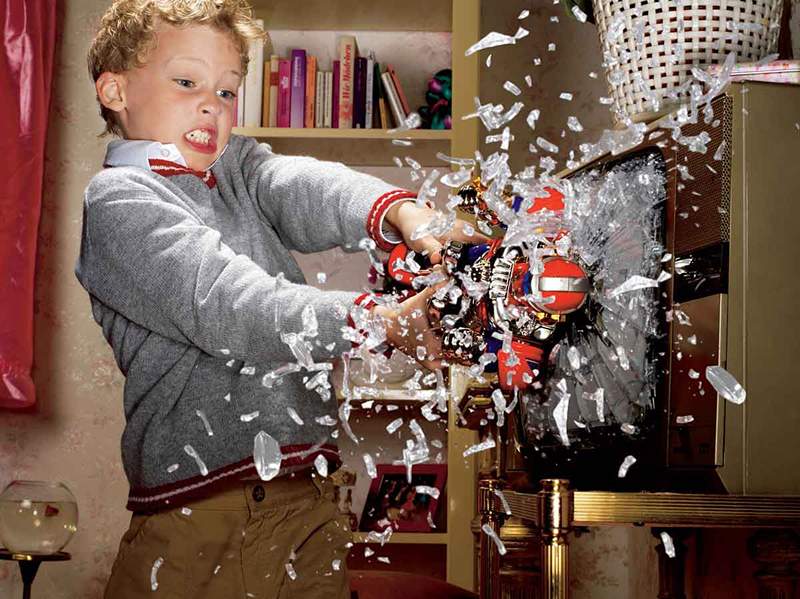Indiscipline in children

- 1289
- 237
- John Von
Children grow and develop with the behavior models they see around them, without fear of being wrong I can say that most of a child who screams there is a father or mother who does the same ..
Many parents come requesting help in reference to the behavior of their children, especially those complaints, we can encompass them in the absence of discipline or attention to the rules imposed at home. Children grow and begin to enjoy their own autonomy often choosing different or opposite paths of those who seem to wish the parents.
Content
Toggle- Behavioral problems in children
- Types of parents
- Example of a case
- Conclusions
Behavioral problems in children
Let's see some of the most common complaints that occur in the behavioral problem of a child:
- My son does not listen to me when I tell him that he has to do something.
- There is no way to go to bed at a reasonable time.
- My son's teachers are fed up with his behavior: he does not yield anything and is always bothering in class.
- My son says lies.
- He is always irritated and answers badly.
All children are different Despite having many of them the problems listed above. The vital experience of each child is what forms their own individuality. That experience is mainly collected from two environments: one the family and the other, the school. In one environment and in another children find models that serve as an example. If those models are not adequate we will be favoring the problem in the child.
Types of parents
Demanding parents, carefree from what is important for the child, nervous, too permissive, little tolerant, hysterical, unimportant, dependent, possessive, phobic, obsessive, unfair, incoherent, ... and many other qualifications that right now no longer They occur, they are the ones that make the difference between an undisciplined child and a disciplined one
In a family it is very easy to find the axis of an entire problematic family dynamics In one of its members who usually corresponds to the most sensitive and susceptible figure, that is to say in the child. Inciding the family environment is unlikely task for a psychologist, first of all parents do not usually accept the bad dynamics that are lived in their territory, which no longer let you can intervene their erroneous routine. Simply converge the problems in the child's figure waiting for you to change what would only be solved by changing family. It's hard but I often feel that way.
 What are ethical standards in children's research
What are ethical standards in children's research Example of a case
As an illustrative example I would like to make you participate in my contact with Laura and her family waiting for it to serve as a reflection for all those who have children.
Laura's mother made an appointment with me to talk to me about her daughter. Came alone and its appearance denoted impatience. Laura is a 9 -year -old girl who changed school at the end of last year for residence change reasons. His previous school was private and of religious tendency and the current, public. It seemed to have "faded" according to his mother with the change of school along with having undesirable behaviors at home.
For example, he painted a piece of wall and when his mother asked him why? He could not answer. Hooked "Moccos" on the wall without knowing the reason. It seemed to show aggressiveness directed towards the new home to annoy the mother whose fanaticism in order and cleanliness were extremely evident. The mother said to be "deranged from the nerves" because in addition to not enduring the girl the husband spent the day working and when she got home she was always tired without helping for anything. Everyone seemed to have the "transfer" symptom in their behaviors.
When Laura appeared in my consultation, that "destructive" girl that her mother had pointed out and I found it appropriate to quote both parents to discover what I imagined. In a few minutes, the interview with the parents became a couple therapy session in which each one threw the dirty rags to the other and I tried continuously to resume the interview towards the figure that seemed more important to me, poor Laura, and I mention it in this way because at that time I could imagine what life would be like for that girl in that family.
A family where affection had become resentment, where grandparents seemed to divide the opinions but no one had placed order in it, a family where each evolutionary step that Laura made was punished for pure overwhelming of the parents.
Laura had come to assume that she would be punished for anything she did with which her anxiety began to overflow. Some behaviors for which he was punished: - Dump a little water outside the glass, talk too much, drain a peach of his hands while eating it. - The punishment was first screaming and slapped to continue sending her to her room without dinner until the next day. His mother's compulsivity led her to punish her if written on the school agenda seemed little neat, if a strand of hair hung disorderly or if the girl's presence had simply made her nervous.
Laura learned and that is the most serious of all to blame for those behaviors or simply for mom's nerves, since she every time she punished her later ran to tell her that because of her now her heart. Another child may have shown challenging behavior at that irrationality but Laura had accepted it as normal behavior. His life was dominated by a large dose of anxiety and if there was no order in family dynamics and in the functioning of these parents the evolution of Laura would not be positive. My insistence on seeing them often, in changing attitudes caused a suspicion in the mother who quickly moved away Laura from my networks. This reaction is not new to me or for most psychologists is something we live with daily in treatment with patients but if the patient is a child anger and impotence are stronger.
Conclusions
If we manage to sensitize many negative models, we will surely advance in the treatment of those undisciplined children, since many are the reflection of our own acts, however well -intentioned that they are.

